Hamill, poet and translator, has created a ravishing anthology of poetry celebrating the spiritual aspect of eros, the longing not only to merge ones body with another, but to join souls. Booklist From the swift grip and succor of todays Dorianne Laux to the flowers-in-a-shell plums of ancient Tzu Yeh, these are voices echoing off the walls of a cave, becoming one voice, one song of eros. Ive seen no better collection. Lily Pond, editor of Yellow Silk: A Journal of the Erotic Arts ABOUT THE BOOK This extraordinary collection of poemscovering thirty centuries of poetry from around the worldcelebrates the erotic spirit in all its forms, from the passion of sexual desire to the intense longing for spiritual union. Beginning with anonymous Egyptian love songs from the fifteenth century BCE and continuing up to todays finest poets, the book draws on a broad range of cultural and spiritual traditions, including ancient Greek and Roman erotic poems, ecstatic Sufi songs, Chinese elegies for lost lovers, and bawdy English satires. Many of the poems are presented here in new translations by the editor, Sam Hamill, one of Americas premier poet translators.
SAM HAMILL has translated more than two dozen books from ancient Chinese, Japanese, Greek, Latin, and Estonian. He has published fourteen volumes of original poetry. He has been the recipient of fellowships from the National Endowment for the Arts, the Guggenheim Foundation, the Woodrow Wilson Foundation, and the Mellon Fund. He was awarded the Decoracin de la Universidad de Carabobo in Venezuela, the Lifetime Achievement Award in Poetry from Washington Poets Association, and the PEN American Freedom to Write Award. He cofounded and served as Editor at Copper Canyon Press for thirty-two years and is the Director of Poets Against War.  Or visit us online to sign up at shambhala.com/eshambhala. The Erotic Spirit AN ANTHOLOGY OF POEMS OF SENSUALITY, LOVE, AND LONGING Edited by Sam Hamill
Or visit us online to sign up at shambhala.com/eshambhala. The Erotic Spirit AN ANTHOLOGY OF POEMS OF SENSUALITY, LOVE, AND LONGING Edited by Sam Hamill  SHAMBHALA Boston & London 2012 To my wife, Gray Foster,and to my daughter, Eron Hamill Shambhala Publications, Inc. The Erotic Spirit AN ANTHOLOGY OF POEMS OF SENSUALITY, LOVE, AND LONGING Edited by Sam Hamill
SHAMBHALA Boston & London 2012 To my wife, Gray Foster,and to my daughter, Eron Hamill Shambhala Publications, Inc. The Erotic Spirit AN ANTHOLOGY OF POEMS OF SENSUALITY, LOVE, AND LONGING Edited by Sam Hamill  SHAMBHALA Boston & London 2012 To my wife, Gray Foster,and to my daughter, Eron Hamill Shambhala Publications, Inc.
SHAMBHALA Boston & London 2012 To my wife, Gray Foster,and to my daughter, Eron Hamill Shambhala Publications, Inc.
Horticultural Hall 300 Massachusetts Avenue Boston, Massachusetts 02115 www.shambhala.com 1996 by Sam Hamill Cover art: La Grande Odalisque (detail) by J. A. D. Ingres, the Louvre, Paris. See also , which constitute an extension of this copyright page. All rights reserved.
No part of this book may be reproduced in any form or by any means, electronic or mechanical, including photocopying, recording, or by any information storage and retrieval system, without permission in writing from the publisher. Library of Congress Cataloging-in-Publication Data The erotic spirit: an anthology of poems of sensuality, love, and longing / edited by Sam Hamill. p. cm. eISBN 978-0-8348-2397-6 ISBN 0-87773-957-9 (alk. paper) ISBN 1-57062-234-5 (pbk.) 1.
Erotic poetry. I. Hamill, Sam.
| PN6110.E65E76 1995 | 95-15438 |
| 808.81 93538dc20 | CIP |
Contents T hirty-five centuries ago, an Egyptian poet sat down under a sycamore tree and gazed out at a river where hungry crocodiles were sunning themselves on sandbars. And as he thought about his feelings for his beloved, who lived on the other shore, he composed a poem: The little sycamore she planted prepares to speakthe sound of rustling leaves sweeter than honey. On its lovely limbs is new fruit and ripe fruit red as blood jasper, and leaves of green jasper.
Her love awaits me on the distant shore. The river flows between us, crocodiles on the sandbars. Yet I plunge into the river, my heart slicing currents, steady as if I were walking. O my love, it is love that gives me strength and courage, love that fords the river. A thousand years after the writing of this poem, a Greek thinker would observe: The soul, to know itself, must gaze into a soul. And that is exactly the place to begin a reading of poems articulating the erotic spirit, poetry rooted in the experience of interpenetrating fleshly and spiritual delight.
The word erotic comes from Eros, ancient Greek god of love, a mischievous trickster given to indulging in cruel pranks, but who remains forever seductive, young, and beautiful. Eros was a major deity in a number of mystery cults and represented the embodiment of desire. He was the son of the goddess of love, beauty, and fertility, Aphrodite, whom Hesiod said rose up from the seafoam (aphros); Homer called her the Kyprian; Plato said she symbolizes intellectual as well as sexual love; modern scholars trace her origins back to the Asian goddess Astarte. Our Egyptian poet discovers within himself a love so profound it moves him to risk life and limb, a love larger than life. Hes never heard of the Greek god or goddess of love, and has his own gods and goddesses and little godlets of adoration to attend. He longs to let his body and her body become one, unified by love as soul searches soul until self is transcended and they come to know, in a moment of passion and tender compassion, the very face of God.
But how to know the self-indulgent desires of the flesh from the truest spiritual connections that transcend selfish impulses? Poets have wrestled with this equation since the dawn of language. One way to attempt resolution is to explore poetry of the erotic spirit as a handbook, a guidebook for care of the lovers soul. Desire confounds us, Buddhist, Christian, Muslim, Jew, atheist, pantheist, agnostic... desire confounds us. Our vocabulary of the erotic spirit is often impoverished. Denis de Rougemont, in Love in the Western World, divides love into two types: Christian love, or agape, a love between equals concluding in a marriage for the purpose of procreation; and eros, a love between unequal persons, rooted in passion, rejecting marriage, and growing ever more passionate through separation of the lovers.
De Rougemont claims eros entered Western civilization only through the Catharist heresy of the twelfth century. By my reckoning, he missed the mark by about eighteen centuries. Still, he is right when he claims a devotional foundation for the poetry, a poetics in which the Lady of the poem is representative of Sancta Maria Sophia, figure of eternal wisdom and bride of God. In this context, the longing for the perfection of love, for its spiritual realization as well as for its embodiment, is a longing for a physical manifestation of Gods love and follows an attitude of adoration established in the Song of Songs. It took an Inquisition to expel belief in such heresies. The most universally influential anthology of poems of the erotic spirit, The Song of Songs, a collection with roots in Hebrew, Aramaic, Greek, and Egyptian, is an epithalamion, a marriage ceremony in verse, a celebration of the sanctity of the erotic spirit of love between partners.
The lovers are equal and erotically inspired. More than just a collection of poems, The Song of Songs has come to be a single suite that is larger than the sum of its parts, sequential in gathering power as phrases or images recur. It establishes familial connections. The bride is also a sister, as are the women who bear witness; and the groom is a brother, as are all men present. The bride says: I return from the wilderness on the arm of my belovd whom I awakened under the apple tree where his mother bore him. The groom then is a son of Eve who ate the apple of knowledge and was suddenly shamed by her nakedness and expelled from the perfect garden.
Next page
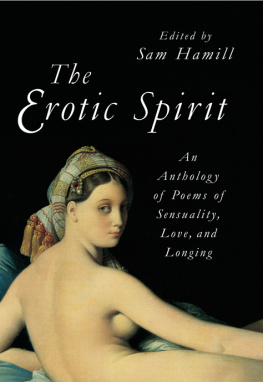

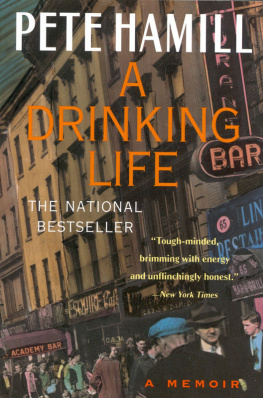

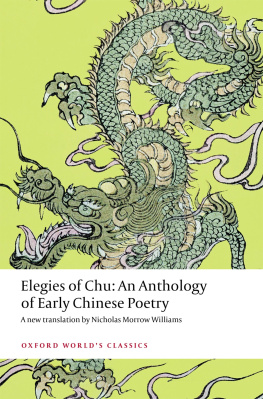
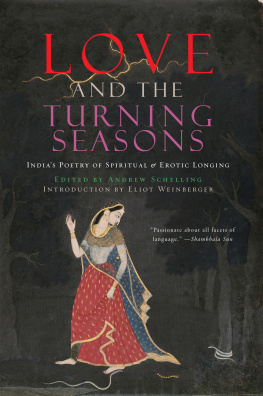
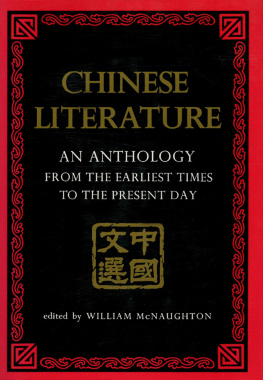
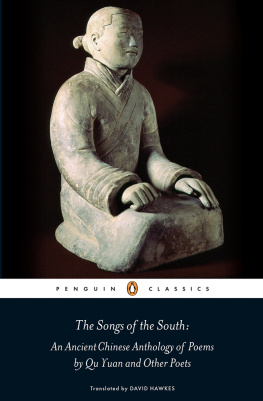
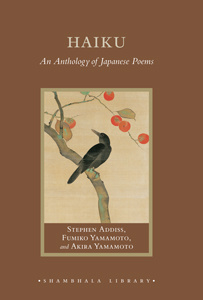
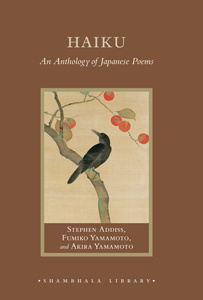
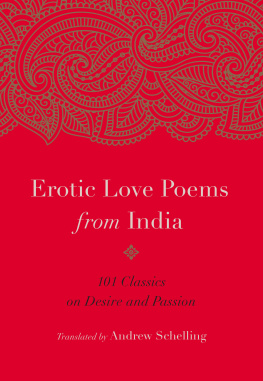
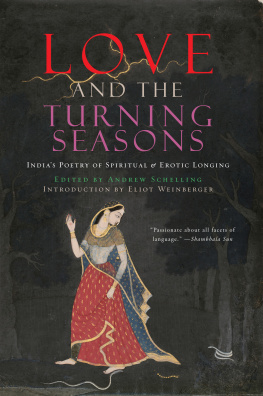

 Or visit us online to sign up at shambhala.com/eshambhala. The Erotic Spirit AN ANTHOLOGY OF POEMS OF SENSUALITY, LOVE, AND LONGING Edited by Sam Hamill
Or visit us online to sign up at shambhala.com/eshambhala. The Erotic Spirit AN ANTHOLOGY OF POEMS OF SENSUALITY, LOVE, AND LONGING Edited by Sam Hamill  SHAMBHALA Boston & London 2012 To my wife, Gray Foster,and to my daughter, Eron Hamill Shambhala Publications, Inc. The Erotic Spirit AN ANTHOLOGY OF POEMS OF SENSUALITY, LOVE, AND LONGING Edited by Sam Hamill
SHAMBHALA Boston & London 2012 To my wife, Gray Foster,and to my daughter, Eron Hamill Shambhala Publications, Inc. The Erotic Spirit AN ANTHOLOGY OF POEMS OF SENSUALITY, LOVE, AND LONGING Edited by Sam Hamill